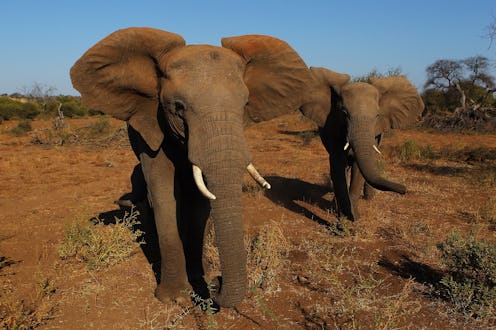News
Trump Is Letting Hunters Import Elephant Heads To The U.S. To "Conserve The Species"

It sounds counterintuitive: Hunt elephants to save the species. But it's supposed to explain why the Trump administration will allow hunters to import elephant trophies from Zimbabwe and Zambia.
The Obama administration had previously banned hunters from bringing back the heads of elephants killed in these two African countries, citing concern for a population already threatened by poachers in the illegal ivory trade. But the ban will be lifted under Trump, now that the U.S. Fish and Wildlife Service has determined that hunting African elephants in Zimbabwe and Zambia supports the animal's survival in the wild. Now hunters who killed elephants between Jan. 21, 2016 and Dec. 31, 2018 can apply to bring their trophies back to the United States.
Supporters of the decision argue that by inviting hunters from rich countries to spend a lot of money shooting a specified number of elephants, countries can then pour that money into conservation and the local economy. A single 10-day elephant hunt in Zimbabwe with Discount African Hunts can rake in a minimum of $31,850, for example. The theory suggests that a boost in local communities will take away the need for the impoverished people, trying to provide for their families, to poach elephants. People also argue it would incentivize communities to restore wildlife populations for more hunts. The International Union for Conservation of Nature supports the idea of controlled, sustainable trophy hunts.
"By lifting the import ban on elephant trophies in Zimbabwe and Zambia the Trump Administration underscored, once again, the importance of sound scientific wildlife management and regulated hunting to the survival and enhancement of game species in this country and worldwide," said a statement by Chris Cox, executive director of the NRA's Institute for Legislative Action, according to The Hill.
Some conservationists and journalists have questioned whether the money from big game hunts really does trickle down to local communities, and whether hunting to curb poaching actually works. Safari and game reserves are such a lucrative business in Zimbabwe that political elites often seize profitable hunting land.
As Emmanuel Fundira, Chairman of Safari Operators Association of Zimbabwe, told CBS News in 2015, rural councils receive nothing from the hunting fees foreigners pay, and most of the time, corrupt government officials take the money.
In most cases, you find that the bureaucratic nature of organizations, most of that money may be consumed to a large extent through administration costs and does not necessarily filter directly to conservation.
Assessing the flow of trophy hunting revenue to conservation efforts, a 2016 report by Democrats on the House Committee on Natural Resources found "many troubling examples of funds either being diverted from their purpose or not being dedicated to conservation in the first place."
Jeff Flocken, North American director for the International Fund for Animal Welfare, also countered that trophy hunting devalues the animal at stake. "Why should anyone spend money to protect an animal that a wealthy American can then pay to go kill?" he asked in a 2013 op-ed for National Geographic.
African elephants comprise of two subspecies: forest elephants and savannah elephants. The species is classified as vulnerable: Approximately 415,000 African elephants exist in the wild. But the population is in steep decline because of habit loss and the persistence of poachers killing elephants for their ivory tusks, according to the Center for Biological Diversity. The organization unsuccessfully petitioned the federal government last year to reclassify African elephants as endangered, which would give the species more protections.
Ivory has been considered a valuable material for hundreds of years and a status symbol in some cultures. Despite the international ban on buying and selling ivory across borders, end consumers can still purchase ivory in the form of jewelry, religious ornaments, and household decorations. In an effort to shut down illegal elephant hunting, China — by far the biggest market for ivory — announced it would end its domestic ivory trade.
Nevertheless, the Trump administration seems to agree that hunting "to conserve the species" is a viable method to curb elephant poaching. At the time of writing, the U.S. Fish and Wildlife Service has yet to offer any hard evidence to support reversing their ban on African elephant trophy imports.
The decision also won't gain any fans from animal rights advocates. When Walter Palmer, a millionaire dentist based in Minnesota, shot and killed Cecil the lion outside Zimbabwe's Hwange National Park in 2015, the lion's death sparked outrage. The lion hunter continued to advocate for trophy hunting after the controversy.
Interior Department Secretary Ryan Zinke is also exploring permits for importing other big game trophies, such as lion heads. If that's the administration's idea of protecting threatened species, it's going to have a difficult time convincing conservationists.